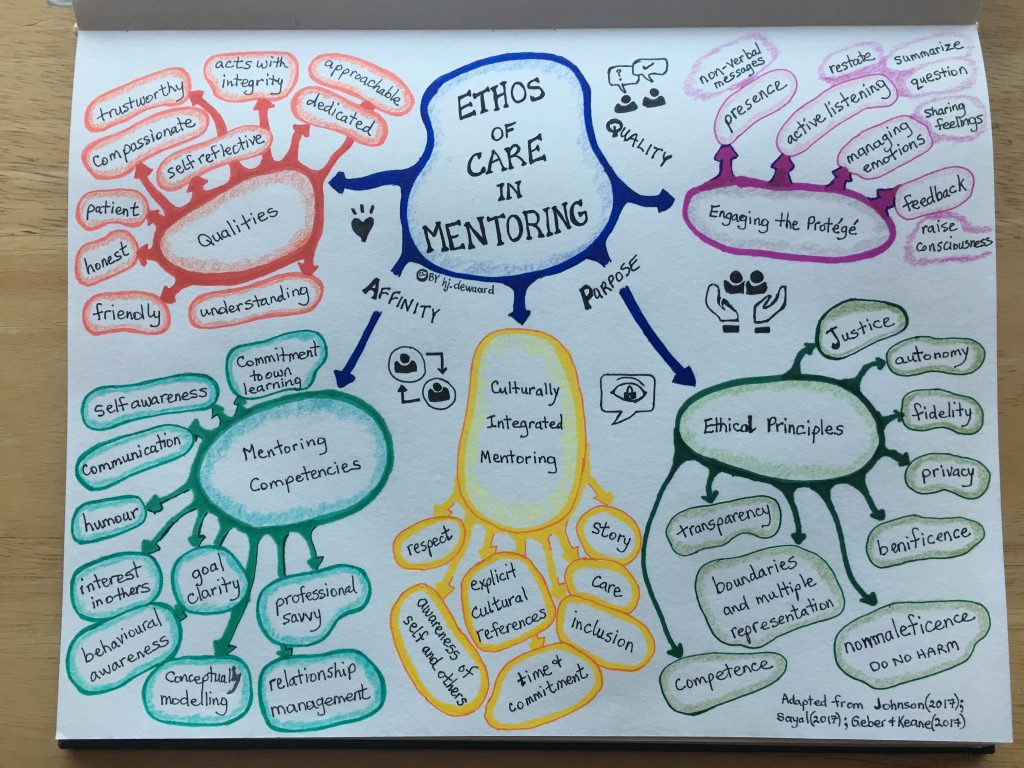Mentoring – annotated bibliography
Here I will post references and annotations for some upcoming scholarly writing and presentations that include a focus on mentoring.
Chien, C.-W. (2015). Pre-service English teachers’ perceptions and practice of field experience and professional learning from expert teachers’ mentoring. Teachers and Teaching: Theory and Practice, 21(3), 328–345. http://dx.doi.org/10.1080/13540602.2014.953817
Cruther provides two articles that connect to mentoring across cultures:
Crutcher, B. N. (2007). Mentoring across cultures. Education Digest, 73(4), 21–26.
Crutcher, B. N. (2014). Cross-cultural mentoring: A pathway to making excellence inclusive. Liberal Education, 100(2), 26–32.
This article has a current connection for this work with a focus on ‘dyads’ and ‘academic’ contexts:
Daniel, A., Franco, S., Schroeder, N. L., & Cenkci, A. T. (2019). Cross-cultural academic mentoring dyads: A case study. Mentoring & Tutoring: Partnership in Learning, 27(2), 164–189. https://doi.org/10.1080/13611267.2019.1611286
With this article linking to online and digital spaces as a means of managing mentoring:
Dorner, H., Fletcher, S. J., & Mullen, C. A. (2012). Mentoring innovation through online communications in a digital culture (pp. 169–183). Longon: SAGE Publications Ltd.
The seven principles mentioned at the end of this article are relevant to OE4BW mentoring scenarios:
Geber, H., & Keane, M. (2017). Ubuntu and transformational mentoring in South Africa: 7 principles of a culturally integrated mentoring response. In D. A. Clutterbuck (Ed.), The Sage Handbook of Mentoring (p. Chapter 31). Sage. Retrieved from https://www.researchgate.net/publication/315045829_Ubuntu_and_Transformational_Mentoring_in_South_Africa_7_Principles_of_a_Culturally_Integrated_Mentoring_Response
love the ideas of tying this to UBUNTU
Ghosh, R. (2018). Diversified mentoring relationships: Contested space for mutual learning? Human Resource Development International, 21(3), 159–162. https://doi.org/10.1080/13678868.2018.1465670
Here is the model of ‘back and forth’ dialogue that Rekha and I have used for our writing:
Guramatunhu-Mudiwa, P., & Angel, R. B. (2017). Women mentoring in the academe: A faculty cross-racial and cross-cultural experience. Mentoring & Tutoring: Partnership in Learning, 25(1), 97–118. https://doi.org/10.1080/13611267.2017.1308095
This ties to my work with Dr. R. C in specific ways….
Hargreaves, A., & Fullan, M. (2000). Mentoring in the new millennium. Theory Into Practice, 39(1), 50–56. Retrieved from https://www-jstor-org.ezproxy.lakeheadu.ca/stable/1477441
Additional resources I’ve used and collected on this topic:
Irby, B. J., Lynch, J., Boswell, J., & Hewitt, K. K. (2017). Mentoring as professional development. Mentoring & Tutoring: Partnership in Learning, 25(1), 1–4. https://doi.org/10.1080/13611267.2017.1312895
Mullen, C. A. (2012). Mentoring: An overview. In S. J. Fletcher & C. A. Mullen (Eds.), The SAGE handbook of mentoring and coaching in education (pp. 7–23). SAGE Publications Ltd.
Rath, J. (2012). Research mentoring in higher education. In S. J. Fletcher & C. A. Mullen (Eds.) (pp. 506–519). London: SAGE Publications Ltd. http://dx.doi.org/10.4135/9781446247549.n34
Reese, J. (2016). Virtual mentoring of preservice teachers. Journal of Music Teacher Education, 25(3), 39–52. https://doi.org/10.1177/1057083715577793
Schunk, D., & Mullen, C. (2013). Toward a conceptual model of mentoring research: Integration with self-regulated learning. Educational Psychology Review, 25(3), 361–389. https://doi.org/10.1007/s10648-013-9233-3
Woods, P., Poropat, A., Barker, M., Hills, R., Hibbins, R., & Borbasi, S. (2013). Building friendship through a cross-cultural mentoring program. International Journal of Intercultural Relations, 37, 523–535. http://dx.doi.org/10.1016/j.ijintrel.2013.08.004
Ethos of Care in Mentoring – graphic by HJ.DeWaard CC BY

This graphic was adapted and designed from elements found in these three articles:
Geber, H., & Keane, M. (2017). Ubuntu and transformational mentoring in South Africa: 7 principles of a culturally integrated mentoring response. In D. A. Clutterbuck (Ed.), The Sage Handbook of Mentoring (p. Chapter 31).
Johnson, W. B. (2017). Ethical Considerations for Mentors: Toward a Mentoring Code of Ethics. In D. A. Clutterbuck, F. A. Kochan, L. Lunsford, N. Dominguez, & J. Haddock-Miller (Eds.), The SAGE Handbook of Mentoring (pp. 105–118). 55 City Road: SAGE Publications Ltd. https://doi.org/10.4135/9781526402011
Sanyal, C. (2017). The effective mentor, mentee and mentoring relationship. In The SAGE Handbook of Mentoring (pp. 143–155). 55 City Road: SAGE Publications Ltd. https://doi.org/10.4135/9781526402011
